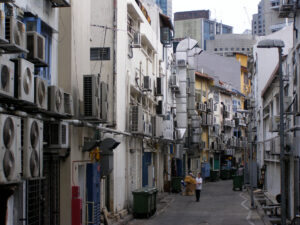Electrical appliances moderate households’ demand response to heat
October 31, 2022

The 2021 United Nations Climate Change Conference (COP26) commenced on 31 October in Glasgow. As extreme weather surges across the world, higher global temperatures and shifting precipitation patterns are expected to disrupt water supply in Asia, the Mediterranean, and many other regions. How households’ water and electricity consumption pattern will respond to rising temperatures is a question worth exploring.
In ‘Electrical appliances moderate households’ demand response to heat’ (Nature Communications, 2018), Associate Professor Alberto Salvo (NUS Economics) leveraged on a sample consisting of 120,000 Singapore households to study how Singapore households’ water and electricity consumption varies according in response to heat waves.
A/P Salvo used a household’s dwelling type to approximate its members’ socioeconomic standing – those living in more spacious HDB flats or condominiums are likely to be more well-off. Households living in apartments with up to three rooms make up 25% of the sample, but they account for 20% of aggregate water consumption and 15% electricity consumption. In contrast, households living in condominiums comprise 17% of the sample, and they account for 16% and 25% of the aggregate water and electricity consumption respectively.
On average, households in 1-room apartments increase their water consumption by 2.6% per +1 °C, whereas their counterparts living in condominiums increase their water consumption by only 0.1%. Conversely, those living in condominiums equipped with air-conditioners increase their electricity consumption by 9.6% per +1 °C, and those living in 1-room apartments increase their electricity consumption by only 4.2%.
A/P Salvo postulates that the disparity between households’ water and electricity consumption could be because the richer households can use more energy-intensive air-conditioners to substitute for water-based cooling services. Thus, hot weather causes richer households’ electricity bills to go up, but it does not significantly impact households’ water consumption. Alternatively, it could be because the wealthier households are already employing water-based cooling services at their maximum capacities, for example, taking two to three showers per day. On the other hand, poorer households would raise their water consumption for cooling purposes only during hot weather.
The results suggest that policymakers in water-stressed cities with a sizeable mass of lower-income households could consider tilting electricity prices in favour of air-conditioning, thereby inducing a drop of excessive water consumption. Air-conditioning, on the other hand, has been proven effective at reducing heat-induced deaths.
Read the article here: https://www.nature.com/articles/s41467-018-07833-3
